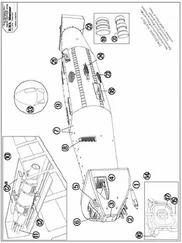David Weber - Old Soldiers
Здесь есть возможность читать онлайн «David Weber - Old Soldiers» весь текст электронной книги совершенно бесплатно (целиком полную версию без сокращений). В некоторых случаях можно слушать аудио, скачать через торрент в формате fb2 и присутствует краткое содержание. ISBN: , Издательство: Baen Publishing Enterprises, Жанр: Фантастика и фэнтези, на английском языке. Описание произведения, (предисловие) а так же отзывы посетителей доступны на портале библиотеки ЛибКат.
- Название:Old Soldiers
- Автор:
- Издательство:Baen Publishing Enterprises
- Жанр:
- Год:неизвестен
- ISBN:1-4165-0898-8
- Рейтинг книги:4 / 5. Голосов: 1
-
Избранное:Добавить в избранное
- Отзывы:
-
Ваша оценка:
- 80
- 1
- 2
- 3
- 4
- 5
Old Soldiers: краткое содержание, описание и аннотация
Предлагаем к чтению аннотацию, описание, краткое содержание или предисловие (зависит от того, что написал сам автор книги «Old Soldiers»). Если вы не нашли необходимую информацию о книге — напишите в комментариях, мы постараемся отыскать её.
Old Soldiers — читать онлайн бесплатно полную книгу (весь текст) целиком
Ниже представлен текст книги, разбитый по страницам. Система сохранения места последней прочитанной страницы, позволяет с удобством читать онлайн бесплатно книгу «Old Soldiers», без необходимости каждый раз заново искать на чём Вы остановились. Поставьте закладку, и сможете в любой момент перейти на страницу, на которой закончили чтение.
Интервал:
Закладка:
The pods rose to their full-extension positions and nodded on the long stalks of their rams as they elevated slightly.
Maneka/Lazarus' camouflaged sensors detected the emission spikes as the Fenrises enabled their missiles. Point defense clusters trained forward and elevated, countermissiles slid into their launchers, and she/they slowed still further, diverting power from her/their drivetrain to reinforce her/their battle screen.
It was all she/they could do. The maximum effective powered range for the Fenris's tactical missiles was only eighty kilometers, because they used counter-gravity drives, like her/their own high-speed missiles did. But the Fenrises' missiles were much smaller than hers/theirs, which meant their drives could be neither as powerful nor as robust. They traded off range and sophisticated seeking systems and penetration aids for velocity and numbers, and they were intended to saturate an opponent's missile defenses, spreading them so thin that at least a few of the fusion-warhead missiles had to get through.
Maneka/Lazarus' missiles were much longer ranged and more accurate, but she/they didn't even consider launching any of them. She/they simply didn't mount enough tubes to crack the Melconian battalion's defenses in return, and that was that. In flat, open terrain, the effective range of a Bolo's direct fire weapons went far towards offsetting the Fenrises' missile capability by forcing them to launch at greater range and expose their missiles to more extended defensive fire. But now the Enemy was less than twenty-four kilometers ahead, still hidden from them by the rough, corrugated terrain.
And at that range, tracking and engagement time was going to be very short, indeed.
"Fire!" Na-Lythan commanded.
The Fenrises vanished into huge boils of light, smoke, and fury as the booster charges blasted their missiles clear of the pods. Five hundred and seventy-six flame-tailed thunderbolts lifted from their launchers, accelerating slowly. But only for an instant. As soon as they had cleared their launchers and reached an elevation of thirty-seven meters, just high enough above the Fenrises for the launching mechs to clear the drive zone, their counter-gravity drives kicked in.
Cramming those drives into such tiny missiles had required all manner of shortcuts and engineering compromises, and there was simply no way to build them tough enough on such small dimensions to survive the enormous power slamming through them. At the best of times, the missiles' drives consumed themselves in just under ten seconds, and they had no atmospheric control surfaces. They could not correct their courses or evade once their drives burned out, which left them dreadfully vulnerable to interception after that point. But for the seconds in which their drives survived, they accelerated the missiles in which they were mounted at a hundred and seventy gravities.
At that rate of acceleration, it would take them 5.38 seconds to reach their destination, and their velocity when they did would be well over thirty thousand kilometers per hour.
Maneka/Lazarus had known exactly what was coming.
Data streamed through her/them like a river of lightning, flickering and flashing so rapidly that even with her direct link to Lazarus, Maneka Trevor could not truly perceive it. It was simply and literally impossible for her merely organic brain to organize data into a comprehensible format at such an incredible rate of speed. But if she couldn't organize it, she could grasp it. She shared Lazarus' gestalt, shared the end result of his computations and analysis.
Stealth features and electronic warfare systems were useless against this attack. The Fenrises'
missiles were specifically designed to be stupid and blind. They would fly whatever profile had been programmed into them before launch, and they would make up for the lack of sophisticated seekers and tracking systems, the absence of advanced penetration EW, with the sheer volume of their fire and the power of their warheads. They were an old-fashioned, saturation attack system, capable of in-flight maneuvers only as long as their drives lasted, which defined their outer range. And the rate at which they accelerated, the velocities they attained, were hard on an airframe. It wasn't that bad in vacuum, but, on average, anywhere from six to seven percent of them would suffer catastrophic structural failure in an air-breathing launch. Which was cold comfort to their targets, given the numbers in which they were launched.
The remote sensors watching the Melconians at the moment of launch had measured the missile pods'
angles of train and elevation with minute, absolute precision. Data stored in Lazarus' tactical files knew the exact launch sequence, cycle time, and acceleration capability of the Fenrises' missiles. Analysis of the emission spikes as the missiles were enabled, and the power levels as the launch command itself was given and the pods cycled through the launch sequence, gave him precious fractions of a second of warning before the missiles actually fired. And armed with all of that information, BattleComp predicted the flight paths of those missiles with the accuracy and certainty of an Old Testament prophet declaring the will of God.
Point defense clusters, antipersonnel clusters, rotary cannon, even infinite repeaters were already moving, swiveling towards the points in space at which she/they knew the missiles must appear. The towering, knife-sharp ridge line almost exactly midway between her/them and the Enemy—the same ridge which had protected the Fenrises from her/their Hellbore and infinite repeaters and would protect them from the blast of their own detonating warheads—forced the missiles to climb, and at their velocity, they could not fly a tight nap-of-the-earth profile. They had to climb well clear of the ridge, expose themselves to her/their fire, and that fire was waiting for them when they did.
The cloud of missiles pitched up over the ridge, then dropped their noses as sharply as only counter-grav missiles could, and streaked directly towards Maneka/Lazarus. Small they might be, compared to the missiles of a Bolo, but they still massed just under 2.4 metric tons. At their velocity, a simple kinetic impact would have yielded the equivalent of over twenty-two metric tons of old-fashioned TNT, but they weren't kinetic weapons.
A tornado of defensive fire ripped into the missile storm as her/their defenses engaged the threat.
Lasers, flechettes, cannon shells, proximity-fused countermissiles which had actually launched fractions of a second before the Fenrises had. It was as if a solid, incandescent battering ram lunged downward, hurling itself across the ridge at them, and its mushrooming head of flame was the missiles being splintered and torn asunder by her/their fire.
She/they killed many of them. Almost six hundred had been fired at her/them, and four hundred and seventy-three were destroyed by her/their defensive fire. Thirty-seven more suffered structural failure and simply disintegrated, and the debris from their disintegration destroyed six more birds which ran into the wreckage in flight. Nine more dipped too close to the ridge line and slammed into the far side of its crest like artificial meteors. But that left fifty-one.
Fusion warheads detonated in the split instant before they struck her/their battle screen. That screen would have absorbed the purely kinetic energy of those weapons without even a flicker, but the Melconian weaponeers who had built them were well aware of that. And so they had designed their warheads to detonate in the last sliver of a second before the battle screen could tear them apart. Not even the Concordiat could have guaranteed truly simultaneous detonation of that many warheads—not at that velocity. Six of them failed to detonate in time, rammed into Maneka/Lazarus' battle screen, and vanished. Another nineteen failed to detonate quickly enough and were killed by fratricide before their fuses activated. Which meant that "only" twenty-six actually detonated as planned.
Читать дальшеИнтервал:
Закладка:
Похожие книги на «Old Soldiers»
Представляем Вашему вниманию похожие книги на «Old Soldiers» списком для выбора. Мы отобрали схожую по названию и смыслу литературу в надежде предоставить читателям больше вариантов отыскать новые, интересные, ещё непрочитанные произведения.
Обсуждение, отзывы о книге «Old Soldiers» и просто собственные мнения читателей. Оставьте ваши комментарии, напишите, что Вы думаете о произведении, его смысле или главных героях. Укажите что конкретно понравилось, а что нет, и почему Вы так считаете.












